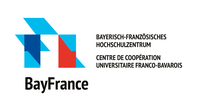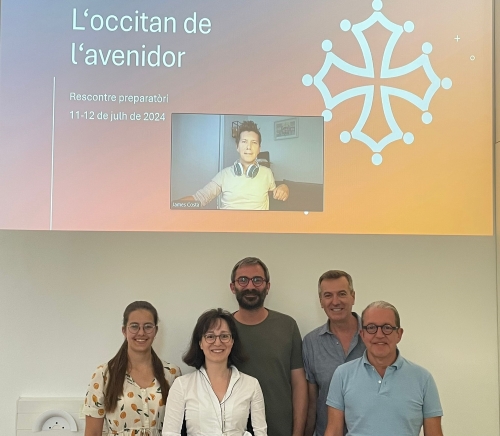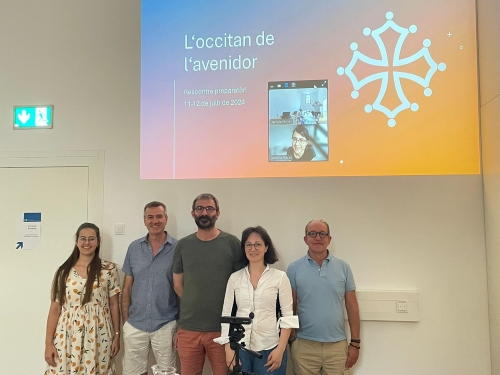L'occitan de l'avenidor/Future Occitan
supported by


In the near future, Occitan in France will be spoken primarily by people who have been brought up in French by their families and who have learnt Occitan at school or in adult education.
Our aim is to analyse the New Speakers of Occitan and the new variety of Occitan spoken by them.
News
21 -23 May 2025, Multilingualism and Minority Languages in a Global Context - 10th Conference of the International Consortium "Multilingualism as a Chance", Davos. Oral presentation : Qui sont les néo-locuteurs et néo-locutrices de l’occitan ? Une enquête sociolinguistique et ses enjeux pour le concept du « néo-locuteur » / de la « néo-locutrice »
12 -13 June 2025, 9en Obrador de Lingüistica Occitana, Tolosa. Oral presentation : Aquisicion del contrast fonemic /e/-/ɛ/ en occitan L2 a travèrs de l’allofonia [e]-[ɛ] en francés L1: estudi comparatiu dels accents franceses del Miègjorn e del Nòrd
25 -27 June 2025, 6th Phonetics and Phonology in Europe, Palma (Mallorca). Satellite workshop "New speaker accents in regional languages of Europe"
30 June - 5 July 2025, XXXI Congresso internazionale di linguistica e di filologia romanza, Lecce. Oral presentations: On ne naît pas néo-locuteur ou néo-locutrice, on le devient. L’acquisition de l’occitan et le concept de la 'muda' (Section Sociolinguistica e variazione) and Acquisition du contraste phonémique /e/-/ɛ/ en occitan L2 à travers l’allophonie [e]-[ɛ] en français L1 : étude comparative des accents du Midi et du Nord (Section Grafematica, fonetica, fonologia e prosodia)
Team


- Daniela Müller, LMU München
- James Costa, Université de Paris - Sorbonne-nouvelle
- Jean-François Courouau, Université de Toulouse 2 - Jean-Jaurès
- Fiona Gehring, Albert-Ludwigs-Universität Freiburg
- Hervé Lieutard, Université de Montpellier 3 - Paul-Valéry
- Daniela Marzo, Albert-Ludwigs-Universität Freiburg
- Rafèu Sichel-Bazin, Université de Toulouse 2 - Jean-Jaurès
The New Speakers of Occitan
We conducted a total of 23 sociolinguistic interviews. In addition, our participants completed the NEO-PI-R (Big Five) psychometric questionnaire, providing objective measures of their personalities to complement the narrative data from the interviews conducted. The analysis of the sociolinguistic data is intended to illustrate the situation of the New Speakers of Occitan in comparison to other, better documented European minority languages such as Catalan, Galician, Irish Gaelic, Scottish Gaelic and Welsh.
Presentation
"Erwerbswege und intrafamiliäre Weitergabe des Okzitanischen bei Neuen Sprecher*innen des Okzitanischen. Ergebnisse sprachbiographischer Interviews aus Montpellier, 2019" ("Acquisition paths and intrafamilial transmission of Occitan among New Speakers of Occitan. Results of language biographical interviews from Montpellier, 2019")
Acquisition paths
Given the lack of compulsory Occitan lessons in the school system in the south of France and the interruption of transmission within families for at least one, if not two generations: What learning and acquisition paths do the New Speakers choose to acquire Occitan?
A conscious decision
Are there decisive moments in the lives of New Speakers when they have made the decision to learn Occitan, often devoting a considerable amount of time to it? Is such a moment an essential prerequisite for the transition from a foreign language learner of Occitan to a New Speaker?
Transmission
Learning a language can benefit from formal education, but for the revitalisation of a language, intergenerational transmission within the family is crucial. To what extent are the New Speakers helping to restore the transmission of Occitan? In other words: Will Occitan become a mother tongue for the children of today's New Speakers, or will it remain a second language to be learnt again and again by individuals from French-speaking families?
Personality profile
Do the psychometric data on personality, combined with the narratives from the interviews, allow us to draw a typical portrait of the individual who, having learnt Occitan in the past or not (e.g. in a Calandreta nursery or primary school), becomes a New Speaker of Occitan?
The language of the New Speakers
We included 15 participants who spoke Occitan as a second language and French as a first language and were thus able to create a parallel bilingual oral corpus. We follow two complementary approaches: (1) a historical and synchronic approach to the Southern French accent that emerged from the acquisition of French as a second language by speakers of Occitan as a mother tongue, from the 13th century to around the middle of the 20th century; (2) a synchronic description of the Occitan accent of the New Speakers, in the light of current theories of second and foreign language acquisition.
The Southern French accent
The accent of French spoken in the south of France, which is shared by the majority of our participants, is the result of a phonological transfer of the characteristics of Occitan. For centuries, Occitan was the mother tongue of the majority of the predominantly rural population in the south of France. However, there is a lack of comprehensive studies detailing the emergence of this accent in the context of bilingualism.
Our approach not only takes into account phenomena that are clearly the result of phonological transfer from Occitan - such as
(1) the regular realisation of the schwa or e muet and its possible backing in the vowel space,
- Presentation "Occitan traces in the Southern French schwa"
(2) the partial oral pronunciation of nasal vowels and the presence of a consonantal nasal part,
(3) the existence of a word accent
but also phenomena that have only relatively recently found their way into Southern French or are currently spreading:
(4) the conditional alternation of the mid vowels, known as Loi de position,
(5) the fronting of [ɔ],
(6) the aspiration of the plosives at the end of the word.
While phenomena (1) to (4) represent traditional features of Southern French as listed in the specialised literature, the presence of phenomena (5) and (6), which are distinctive features of Northern French, would testify to a possible levelling of the Southern French accent towards Standard French.
Accent of the New Speakers in Occitan
While the Southern French accent retains several phonological regularities taken directly from Occitan, these features now tend to fade with the levelling of the Southern French accent to Standard French, which is of Northern origin.
For the New Speakers of Occitan, we thus anticipate a phonological transfer of the phonology of (Northern) Reference French into Occitan, reversing the situation in which the Southern French accent developed a few centuries ago.
Since we will know the characteristics of the French accent of each speaker in our sample, we can directly test the individual transfer from mother tongue to Occitan.
We will analyse the following points in detail:
(1) the centralisation of the unstressed vowel [ɔ] at the end of the word, which is etymologically related to the French e muet in the same position;
(2) the nasalised pronunciation of vowels followed by nasal consonants, which should be oral in Occitan;
(3) the realisation of the word accent in Occitan and the possible transition to a group accent;
(4) the transfer of the Loi de position into Occitan, despite the existence of a phonological contrast between the front mid-high and mid-low vowels in the stressed syllable;
(5) the adoption of the fronting of [ɔ];
(6) the aspiration of plosives at the end of words.
Support
We would like to thank our funding organisations:
- Münchener Universitätsgesellschaft
- Nachwuchsförderungsfonds der Fakultät 13 der LMU München
- Centre de coopération universitaire franco-bavaroise (BayFrance)

